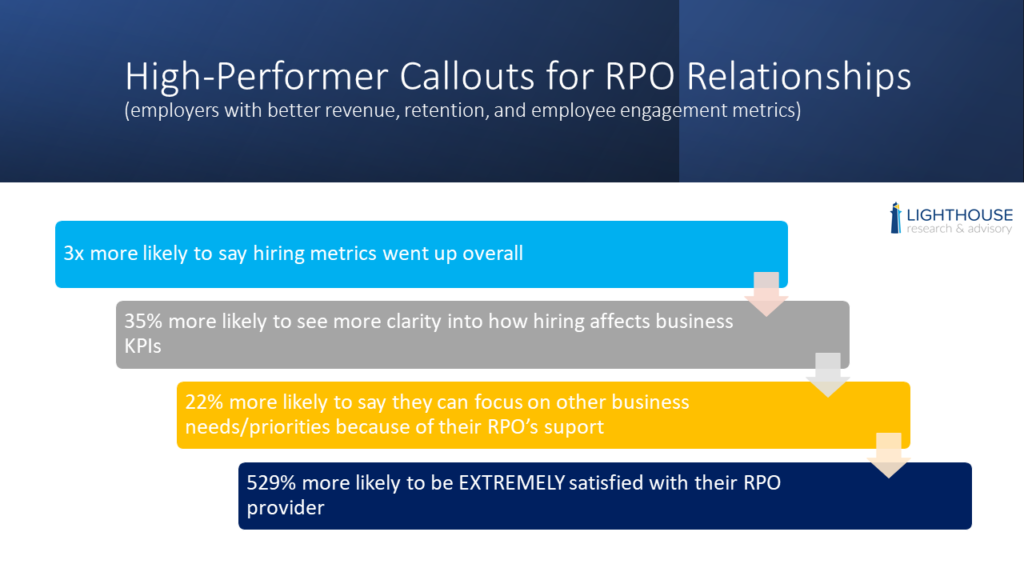Recruitment Process Outsourcing: Services, Value, and Buyer Intent
This week I had the pleasure of serving as the opening keynote for the Recruitment Process Outsourcing Association (RPOA) annual conference, sharing some new findings from a proprietary study on how employers and talent leaders see value in their RPO relationships, what services they want, and how many are planning to change providers.
Want to see the full report on employer perceptions of RPO value? Check it out here.
If RPO is an unfamiliar term for you, it’s essentially a way for companies to bring in external recruiters and embed them into your hiring activities, all while getting the benefit of the RPO’s extensive services across its client base that go beyond the immediate value of having additional qualified recruiters on hand.
For instance, RPO providers are increasingly offering talent market supply insights, helping HR and talent leaders demonstrate to business/operational leaders just how much talent actually exists in their areas of operation, what kinds of skills exist within that candidate population, and what’s happening with pay rates across the board.
The event itself was incredible. I was able to meet so many incredible leaders in the industry, connect with a long-time Zoom friend and VP of Global Talent Acquisition at (in her words) “the biggest company you’ve never heard of,” and hear some success stories of how RPO can come alongside corporate HR and recruiting teams for optimal results.
A new report on this topic is coming out on this very soon, but I wanted to take a moment so share some of the findings because the results were quite impressive.
The Value RPO Partners Bring: The Employer Perspective
In the study (500+ employers), we found company leaders were incredibly positive about the results they get from their RPO providers:
- 84% said their RPO allows them to scale hiring up/down as needed based on demand
- 8 in 10 said the partnership lets them have more clarity into how hiring affects business KPIs
- 88% say that having an RPO supporting hiring allows them to focus on other business-critical priorities
Not only are those impressive, but we see some tremendous splits in the data when we look at high-performing firms compared to the rest. For clarity, high performers have better revenue, retention, and employee engagement metrics than other firms.
What’s helpful about RPO providers is that when times are challenging and you can’t find enough talent, they can help to augment your existing staff, and from the candidate perspective, they can’t tell which recruiters work for you and which work for the RPO. However, if things slow down as some economic indicators are showing, the RPO team can scale down to just a few recruiters supporting the client without the employer having to lay off a bunch of recruiting staff in lean times.
There’s more to come in the new report, but for employers that are leveraging RPO providers, this is an incredible set of results. For RPO providers in the market, this also helps to give you some additional context for what employers value in a hiring partner.

Ben Eubanks is the Chief Research Officer at Lighthouse Research & Advisory. He is an author, speaker, and researcher with a passion for telling stories and making complex topics easy to understand.
His latest book Talent Scarcity answers the question every business leader has asked in recent years: “Where are all the people, and how do we get them back to work?” It shares practical and strategic recruiting and retention ideas and case studies for every employer.
His first book, Artificial Intelligence for HR, is the world’s most-cited resource on AI applications for hiring, development, and employee experience.
Ben has more than 10 years of experience both as an HR/recruiting executive as well as a researcher on workplace topics. His work is practical, relevant, and valued by practitioners from F100 firms to SMB organizations across the globe.
He has spoken to tens of thousands of HR professionals across the globe and enjoys sharing about technology, talent practices, and more. His speaking credits include the SHRM Annual Conference, Seminarium International, PeopleMatters Dubai and India, and over 100 other notable events.

